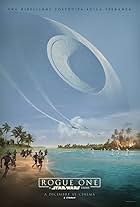
Spleen
Iscritto in data gen 2001
Distintivi8
Per sapere come ottenere i badge, vai a pagina di aiuto per i badge.
Valutazioni1951
Valutazione di Spleen
Recensioni718
Valutazione di Spleen
Charlie Kaufman can't tell jokes. Well, so what, you might say; according to some, nor could Shakespeare, and what of that? But then, Shakespeare never wrote a play consisting of nothing but jokes.
Of course, Kaufman the writer has been badly let down by Kaufman the director (although no more or less badly than he was let down by Spike Jonze or Michel Gondry, than whom he is at least no less talented) – so it's hard to say where exactly the fault lies; but while watching this film one comes to the slow and dazed realisation that what it's attempting is humour.
For example: Caden (Philip Seymour Hoffman) is raging about his daughter's getting a tattoo at an early age. Claire (Michelle Williams) takes off her shirt to reveal that her back is entirely covered by a bright red tattoo of Satan, which she says she got at the same age. Caden, who has been sleeping with Claire for several years: "Well, I've never seen THAT before." It's a joke right out of "The Simpsons"; one can imagine Homer Simpson delivering the same line. The difference is that in "The Simpsons" the line would have been funny, and we wouldn't have blinked, sat in puzzlement through whatever happened next (one ceases to care after a while) and perhaps even made it through the closing credits and out into the street before realising that this line was supposed to be funny. Kaufman presents jokes to us the way a cat might present a dead bird, then stalks off to bask in his own cleverness while we're struggling to work out what our reaction is meant to be.
Not one of Kaufman's jokes, conceits, or visual touches, not the one-liner about the tattoo, not the unexplained Zeppelin that weaves its way through the scale-model New York tenements, not the miniature portraits you need magnifying glasses to see, not the laboured basic premise of the film, has any impact or life. Anyone can come up with these ideas: philosophy postgrad students are already able to generate thought experiments of this kind by the dozen, and often tell them better. And, alas, the film is like conceptual art. Once I tell you what it's about you might as well not bother to watch it. You've already got the gag. And it's not funny.
Of course, Kaufman the writer has been badly let down by Kaufman the director (although no more or less badly than he was let down by Spike Jonze or Michel Gondry, than whom he is at least no less talented) – so it's hard to say where exactly the fault lies; but while watching this film one comes to the slow and dazed realisation that what it's attempting is humour.
For example: Caden (Philip Seymour Hoffman) is raging about his daughter's getting a tattoo at an early age. Claire (Michelle Williams) takes off her shirt to reveal that her back is entirely covered by a bright red tattoo of Satan, which she says she got at the same age. Caden, who has been sleeping with Claire for several years: "Well, I've never seen THAT before." It's a joke right out of "The Simpsons"; one can imagine Homer Simpson delivering the same line. The difference is that in "The Simpsons" the line would have been funny, and we wouldn't have blinked, sat in puzzlement through whatever happened next (one ceases to care after a while) and perhaps even made it through the closing credits and out into the street before realising that this line was supposed to be funny. Kaufman presents jokes to us the way a cat might present a dead bird, then stalks off to bask in his own cleverness while we're struggling to work out what our reaction is meant to be.
Not one of Kaufman's jokes, conceits, or visual touches, not the one-liner about the tattoo, not the unexplained Zeppelin that weaves its way through the scale-model New York tenements, not the miniature portraits you need magnifying glasses to see, not the laboured basic premise of the film, has any impact or life. Anyone can come up with these ideas: philosophy postgrad students are already able to generate thought experiments of this kind by the dozen, and often tell them better. And, alas, the film is like conceptual art. Once I tell you what it's about you might as well not bother to watch it. You've already got the gag. And it's not funny.
Okay, not unmitigated. The shot of the swirling coffee was nice to look at.
It's not fair to judge Godard by this one film, but if one were to do so, one would be forced to conclude that he's a charlatan. A real artist wouldn't have to talk our ears off for two solid hours. He talks at us through his characters, through his whispered narration (that guttural whisper is really hard to take after a couple of minutes); and even his incessant cinematic doodling is a kind of pitilessly boring monologue (he'll suddenly turn the soundtrack off not so much for effect as to goddamned well SAY something about cinematic convention I don't know what, exactly; the point he's trying to make is surely a banal one, whatever it is).
Godard is so enamoured of language that not only does he use it blast it at us relentlessly; he has himself and his cast, when they run out of anything else to talk about, which doesn't take long, start talking about language. And what twaddle they talk on the subject! "I suppose these are my eyes. How do I know they're my 'eyes' and not my 'knees'? Because people told me. But what if they hadn't?" That's not really the best example of fatuous nonsense; I remembered those lines among all the others because, silly though they are, they at least made sense: they don't reveal a mind so muddied by bad philosophy that it cannot think at all, which is what most of the rest of the script reveals.
It's not fair to judge Godard by this one film, but if one were to do so, one would be forced to conclude that he's a charlatan. A real artist wouldn't have to talk our ears off for two solid hours. He talks at us through his characters, through his whispered narration (that guttural whisper is really hard to take after a couple of minutes); and even his incessant cinematic doodling is a kind of pitilessly boring monologue (he'll suddenly turn the soundtrack off not so much for effect as to goddamned well SAY something about cinematic convention I don't know what, exactly; the point he's trying to make is surely a banal one, whatever it is).
Godard is so enamoured of language that not only does he use it blast it at us relentlessly; he has himself and his cast, when they run out of anything else to talk about, which doesn't take long, start talking about language. And what twaddle they talk on the subject! "I suppose these are my eyes. How do I know they're my 'eyes' and not my 'knees'? Because people told me. But what if they hadn't?" That's not really the best example of fatuous nonsense; I remembered those lines among all the others because, silly though they are, they at least made sense: they don't reveal a mind so muddied by bad philosophy that it cannot think at all, which is what most of the rest of the script reveals.
Poor Kenneth Branagh an undervalued director if ever there was one is likely to receive far more blame than he deserves for the way this turned out. To be sure, he must have signed off on the tacky, minimalist set design (maybe this would work, or seem to work, if you saw the movie on TV) which in turn forced him into a series of count-the-pores close-ups in order to get away from the bare surfaces and garish lighting. But this set basically echoes, admittedly in the most simple-minded possible way, the minimalist, engineered-rather-than-written screenplay which Harold Pinter manufactured out of Anthony Schaffer's vastly superior original. Schaffer's version was a stage firecracker, and so perhaps if looked at in the cold light of day it is a little mechanical and formulaic; but Pinter's re-working of the material is ten times more mechanical and formulaic; the chief difference is that there's no firecracker: Pinter doesn't want to run the risk of giving us something to enjoy. He seems to think the goal of black comedy is to mortify our flesh and dull our intellect.
Michael Caine is magnificent, but a large part of that magnificence consists in his ability to turn Pinter's stop-and-start dialogue into a performance of any kind, let alone a good one. How hard this task is can be seen by looking at Jude Law, who, without bad acting or any obvious misjudgement, utterly fails to do so.
Michael Caine is magnificent, but a large part of that magnificence consists in his ability to turn Pinter's stop-and-start dialogue into a performance of any kind, let alone a good one. How hard this task is can be seen by looking at Jude Law, who, without bad acting or any obvious misjudgement, utterly fails to do so.
Informazioni dettagliate
Valutazione di Spleen
Sondaggi effettuati di recente
114 sondaggi totali effettuati





























